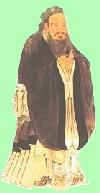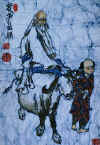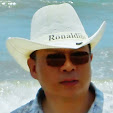老哈閑筆 LAOHA’S PEN
詩歌,翻譯,及其它。 Poetry & Translations, and more⋯⋯
Monday, February 28, 2005
The Sure Thing
“It’s the closest to the sure thing before it becomes a sure thing.” --- a poker player‘s comments about the daily high hand during the last hand, two minutes before the hour when the bonus gets paid.
Sunday, February 27, 2005
Wang Bo (唐) 王勃
Wang Bo, 650-676, a Chinese poet during Tang dynasty (618-907).
Amid Mountains
How sad do I feel,
Yangtze river slow.
Home, ten thousand miles,
A long way to go.
And the wind blows high
In late autumn sky.
Over the mountains
The golden leaves fly.
Translated by Laoha (X. M. Li) on 03/22/2003.
《山中》
长江悲已滞,万里念将归。
况属高风晚,山山黄叶飞。
zenyueh: It's Time 《是時候了》
The fish
Left the shallow water
Swimming towards the deep sea.
In the depth of the sea,
There is no sorrow.
Translated by Laoha (X.M.Li) on 9/13/2004
zenyueh: Flower Alike 《如花》
Flower alike, peaceful and beautiful,
The pain of earth cracking
The flower knows
You know
And I know
Translated by Laoha (X. M. Li) on 03/22/2004
OF THEE I SING
A collections of poems By Timothy Liu, published by the University of Georgia Press, 2004.
I am currently working on the Chinese translation of the book.
Saturday, February 26, 2005
zenyueh 释如斌

Shih Ru Bin, a Buddhist poetess, pen name "zenyueh", born in 1964, curently living in a convent in Taiwan.
释如斌,佛门女诗人,笔名“zenyueh”,生于1964年,在台湾出家。
SATR AND DUST《星与尘》
Water Moon Bodhisattva《水月观音》
It's Time 《是時候了》
Flower Alike 《如花》
Study "Lotus Sutra" in the Winter Night 《冬夜读〈法华〉》
zenyueh: Study "Lotus Sutra" in the Winter Night 《冬夜读〈法华〉》
1.
The notebooks are no longer needed,
life is so pressing.
Those numbered lines and paragraphs are stuffed up
with pieces of childish poetry.
Today, tomorrow,
spring equinox, winter solstice,
you passed by me in a big hurry.
My black hair has already turned into white snow.
2.
In a winter's night dream,
back to the Spirit Mountain Gridhrakuta,
the wonderful Lotus Sutra shone on
the flower in between your fingertips
and the smile on his face.
The rain of Mandarava flowers
poured from heaven for a whole summer.
Stop! Stop! No need to speak!
Stop! Stop! No need to speak!
3.
The rain kept falling.
On the eaves, the leaves did too.
Love and hate out fron karma
are glued on the sorrowful face of mine
attracted to your soft and gentle chattering.
Removing the barriers, showing the truth,
the Lotus Sutra, the only wonderful Sutra,
leads my ignorant, arrogant mind
out into a solemn peace.
Translated by Laoha (X.M.Li) on 11/9/2003
释如斌〖冬夜讀《法華》〗
(一)
再也不需要記事本了
生命如此煎迫
年少的詩篇填滿那印著數字
的欄位
今天 明天
春分 冬至
你匆匆走過
我青絲成雪
(二)
冬夜夢回靈山
妙法蓮華 映照
你的拈花
他的微笑
天雨曼陀羅花
注盈一整個夏天
止止不須說
止止不須說
(三)
細雨扉扉 簷前落葉
往劫之愛憎 停駐在我憂傷的容顏
戀慕你的綿綿絮叨
開權顯實 唯一妙法
教我孤傲懵懂的心
走出一片莊嚴
华尔特-兰多 《75 岁生日有感》On His Seventy-Fifth Birthday
我与世无争,何事值我嗔?
深爱艺术美,更爱自然真;
生命之火旺,早暖我心身;
焰势渐微时,我当离凡尘。
老哈译@2003-1-8
华尔特-兰多 Walter Savage Landor

华尔特-兰多,1775 - 1864, 英国诗人和散文家,在牛津接受的教育。在与他父亲的一次争吵后,他移居威尔士,并在那里写下史诗《格比尔》(1798年)。他的中年在意大利度过,那也是他最富于多产的岁月。在那里,他完成了多部头的散文作品《臆想对话》中的绝大部分,其中包括了古代和现代名人间近150次对话。兰多的诗文风格从诗史到讽刺无不囊括,包括许多即清纯又强烈的歌词。他的其他作品包括《伯里克利和阿斯帕西娅》(1836年),《古希腊人》(1847年),《英勇的牧歌》(1863 年)。
《75 岁生日有感》 On His Seventy-Fifth Birthday
我与世无争,何事值我嗔?
深爱艺术美,更爱自然真;
生命之火旺,早暖我心身;
焰势渐微时,我当离凡尘。
老哈译于2003-1-8
Friday, February 25, 2005
罗伯茨爵士《晚祷十四行》A VESPER SONNET
紫罗兰的色彩,浸染这静静的傍晚,
从令人心旷神怡的天边淌来,象小溪一样。
轻轻抹去昼色,犹似圣酒的清香,
含一丝欣悦,兑些许露水,还带有梦幻。
暖酒般的薄暮,在峡谷里弥漫,
四处有孤独的玻璃门在闪耀。
天空中,变幻的紫色最终烟消,
恢复平静,就象上帝和祥安然。
东西两面山地环绕,俯瞰高空
清晰可以看见,被山火啃啮过的灌木
象琥珀一样精巧相连,在暗地里鲜红。
只留下枯萎的荆棘。啊,这安详肃穆
为白喉莺的歌喉穿透,直到星光萌动
在传送著神赐的祝福。
老哈译 @ 2003-12-16
查尔斯-罗伯茨爵士 Sir Charles George Douglas Roberts

查尔斯-罗伯茨爵士,1860 - 1943,加拿大作家,诗人。出生在加拿大的新不伦瑞克。他是头一个以作家身份被封为爵士的加拿大人。他有67本以上的著作留世,其中最著名的有,《俄里翁》(1880 年),《潜水员的口吻》(1886 年),《诗选》(1936 年),以及其他歌词和田园诗卷;还有故事《野生动物观察者》(1904 年),《蹄和爪》(1913 年)等;以及一本流行的《加拿大历史》(1897 年)。
《晚祷十四行》 A VESPER SONNET
紫罗兰的色彩,浸染这静静的傍晚,
从令人心旷神怡的天边淌来,象小溪一样。
轻轻抹去昼色,犹似圣酒的清香,
含一丝欣悦,兑些许露水,还带有梦幻。
暖酒般的薄暮,在峡谷里弥漫,
四处有孤独的玻璃门在闪耀。
天空中,变幻的紫色最终烟消,
恢复平静,就象上帝和祥安然。
东西两面山地环绕,俯瞰高空
清晰可以看见,被山火啃啮过的灌木
象琥珀一样精巧相连,在暗地里鲜红。
只留下枯萎的荆棘。啊,这安详肃穆
为白喉莺的歌喉穿透,直到星光萌动
在传送著神赐的祝福。
老哈译于2003-12-16
Tuesday, February 22, 2005
Liu Bang (汉) 刘邦
Liu Bang, 256 BC- 197 BC, the founder and the first emperor of Han Dynasty (206 BC - 220 AD) .
OF THE STRONG WIND
The wind comes strong
And the clouds fly.
Going back to where the home belongs
After the conquest of all countries under the sky.
To guard the land for long,
How to find the warrior supply?
Laoha @ 2005-2-22
《大风歌》
大风起兮云飞扬,
威加海内兮归故乡。
安得猛士兮守四方?
Monday, February 21, 2005
“Victory will be claimed by those with the most stamina.”
“胜利将由最有耐力的人获得”
“Victory will be claimed by those with the most stamina.”
“真正的功业好象河流,越深越静。”
“The real achievement is like a river, the deeper the quieter.”
(Chinese Calender 2/20/2005)
Sunday, February 20, 2005
PICTURES 图片
SOMEBODY 人
罗伯特-克立尼 Robert Creeley
Timothy Liu 刘悌摩
zenyueh 释如斌
华尔特-兰多 Walter Savage Landor
查尔斯-罗伯茨爵士 Sir Charles Roberts
Confucius 孔子
Lao Zi 老子
SOMETHING 物
OF THEE I SING《我为你而歌》
Howard Ely Award 伊莱奖
Residents of Reno Nevada《雷诺居民》
雨水 Rain Water
SOMEWHERE 地
Grand Canyon
The Great Salt Lake《大盐湖》
Tunnel《隧道》
Snow Storm in Grand Canyontaken《美国亚利桑那大峡谷雪景》
Wendover Pass - the border town between Nevada & Utah《温多屋 - 犹他州与内华达州交界的小镇》
OF MY FAMILY 家
《巧薇幼稚园毕业》Kimberly is graduating from kindergarten, 2005-4
2005-3 Kim 《巧薇近影》
Laoha at Yosemite 《在优山美地的老哈》
CONTENTS 总目
CHINA POET 中国诗人
INTO CHINESE 汉译作品
CHINESE SAGES 华夏圣贤
PROVERBS & QUOTES 谚语及引语
2. POETRY 诗歌
Wordsworth Revelation
3. REFLECTIONS 杂感
4. FICTIONS 小说
VANISHING CLOUDS 烟消云散
AS OF DREAMS & OUT OF IMAGINATIONS 如梦似幻
5. THE EXPERIENCES 见闻
FOOTSTEPS 漫游足迹
THROUGH THE CORNER OF MY EYES 眼角余光
OVER THE WIND 道听途说
6. BOOKSHELF 读书
7. PERSONAL 个人
DAYS OF MERCURY 似水流年
OF MY CHILDREN 孩子们的耶
MY LIFE & MY FAMILY 往事与家史
8. FAVORITES 收藏
9. PICTURES 图片
10. FOOD & HEALTH 饮食养生
周天搬运法
The Bright Mistake《光明的错误 》

I see it
I see it
I see it
Yours
Mine
And many others’
Big
Small
Obvious
Undistinguishable
Countless mistakes
I want to
Set fire
On all of them
And hold it high as a torch
To bright up
The future path my life takes
我看见了
我看见了
我看见了
你的
我的
还有形形色色其他人的
大的
小的
显而易见的
难以觉察的
数不清的错误
我要
用一把火
点燃这一切
当作火炬高高举起
来照亮
自己未来生命的路。
2/14/2005
Photo Snow Storm in Grand Canyon
taken by Laoha, Spring Break 2003.
相片《美国亚利桑那大峡谷雪景》,
老哈摄于2003年春假

Websites 网站 - Poetry 诗歌
中国诗人
中国诗人论坛
诗歌生活
诗天空 Poetrysky
华语世界网论坛
白云诗塾
方外與方內
非马诗歌世界
绿音的诗
稻香居电脑作诗机网络版5.xxN
中国百年华人诗歌选集
译诗库
300 Tang Poems
The Academy of American Poets
Poetry Society of America
American Poets Society
Canadian Poetry
Bartleby
The Greenwood Encyclopedia of American Poetry
Anthology of Modern American Poetry (Oxford University Press, 2000) Edited by Cary Nelson
Modern & Contemporary American Poetry
Modern American Poetry (1919) Edited by Louis Untermeyer
RHYMING DICTIONARY AND THESAURUS
Passions in Poetry
pip talk
International Library of Poetry
Poet's Workshop
PEN American Center
Noble House
Gambling is part of the human nature
Casino is an arena which holds shows by people from all walks of life. Under the pressure of the gambling activities, it’s the time when the true characters emerge. You will be surprised to see how someone, whom you think you know very well, when in the situation of heavy gambling actions, behaves greatly different from those under normal circumstances.
Gambling is part of the human nature, like many other risk taking activities, which is genetically passed down through the evolution of the human race over millions of years. The role of gambling in the survival of human race must be similar to that of sex.
The key purpose of the sex is to pass down the genes. When there is no need to reproduce, the sex still function as normal. Gambling, risk taking, games, and adventures still play a very vital role in people’s daily life nowadays, even though they might be hazardous a lot of the time. It is better to understand them than just to discard them as bad habits or vices.
It is said there are three stages in human evolution. First we learned to adapt to the environments to survive. Then we learned to changed the environments in order for us to live better. The third stage is still to come, which is to change ourselves genetically to fit into the changes of the environments. Even after we enter the third stage, we still be better off to learn how to follow our own nature for our own best.
02/20/2005
“Character is the behavior of yours in the darkness.”
“品格是你在黑暗中的为人。”
“Character is the behavior of yours in the darkness.”
“开启学问金库的钥匙在各自手中。”
“The key to the knowledge treasury is in one's own hand.”
(from Chinese calendar 2/19)
Saturday, February 19, 2005
The Wanderers《漂泊在外的人》

后山上到处都是残雪,不时
飘来一阵薄雾。家里温暖
如春,凤凰卫视的节目
在延续着中国新年的节日气氛。
翻开日历新的一页。发现今天
是雨水。日历上的画面里下着雨,
风吹的厉害,江边的树都被刮弯了腰。
漫漫的江面上有一艘小船,船头上的
艄公头戴斗笠,身披蓑衣,
在用力摇橹。在船篷的
阴影下,隐隐约约可以看到
一位书生模样的人端坐
在船中央。唉,漂泊在外的人哪!
The fog come and go on the Peavine mountains
behind the house, where the melting snow is everywhere.
In the house, it's as warm as in spring. On TV, the Phoenix
satellite program is extending the holiday atmospheres
of Chinese New Year. Tearing a new page from the Chinese
calendar, I find today is the day for the spring rain. It's raining
in the picture on the calendar. So strong the wind
that the trees on the riverbank are bending over.
There is a boat floating on the vast waters of the river
with a helmsman, in bamboo hat and straw rain cape,
strenuously propelling with the scull. Under the shadow
of the boat covering, a figure of scholar type can be vaguely seen
sitting in the center of the boat. Oh, the wanderers!
02/19/2005
A Brief Autobiography of Malcolm X
Hello, my name is Malcolm Little, but you might know me as Malcolm X. I was born in Omaha, Nebraska on the 19th of May in 1925. I am the forth of eight children in the family. My family moved to Michigan when it was before my 4th birthday. I grew up in Langsing, Michigan. My father’s name is Elder, and my mother’s name is Louise. I am famous for trying to make the black and the brown equal with the white.
My father died while I was six. He got run over on the street by a streetcar. My mother began to be mentally ill. They had to put her into a mental hospital. My brothers and sisters were separated because we had no father or mother to take care of us. That happed when I was in the middle school. I moved to Boston with my half sister and became one of the night life people, and later I went to New York.
After a few years, while selling drugs, I made my own armed burglary. During one of the armed robbery, the police came and arrested me. I was sentenced to jail for seven years, where I took reading books and writing to my family members as my past time. My brother, Reginald, wrote to me about the Nation of Islam. When I got out, I joined them. After that, I went through a transformation. Then I knew the black and the brown were treated wrongly.
I made speeches about the white men not letting the black and the brown do things. We should be able to do what we want to do. I believe everyone is a human being no matter what the skin color. We are all equal.
I also believe the white man wants the black man to be unclean, ignorant, and immortal. God gave us rights, human rights are the rights that should be recognized by all nations of this earth.
My father taught me that. He was a supporter of black nationalist. The Black Legion, or as might you know, the Ku Klux Klan went to my house when I was little and they shot their riffles and shot guns demanding my father to come out.
I remember, on a cold day in February, I was making a speech, I heard a gunshot and then I died. I lay on the floor dead.
By Sheng Li, 2/19/2005
Friday, February 18, 2005
坚持不懈
在新年的日历上看到一句话,对我应该是至关重要的:“才气就是长久的坚持不懈。”我需要的就是坚持,没有坚持的原因是因为立志不坚,立志不坚是因为参悟未到火候。生命是珍贵的,去珍惜、去把握、去享受每一分每一秒吧!这才是幸福圆满的人生。
【我有门】
一、〖我有〗之含义
1、〖我有生命〗
我的本原,是我一切的根本,所有的生命都是独一无二的,也是无法替换的,是绝对不可以缺少的。
生命有三种存在形式,自身生命,众它生命,非生生命。
敬生。神是不存在的,如果非要信仰神,那么生命就是我们敬仰的神。
敬仰生命,热爱生命,珍惜生命。
养生。身体健康,营养,身心调节,延年益寿,医疗保健。
修生。运用科学知识,提高生活水平,改进社会制度,协调相互关系,发现新的生活方式,开拓生存空间。
2、〖我有时间〗
我的生命所全部拥有的时间,是我仅有的全部财产,是非常有限的,是在不知不觉中随时随地都在消失的,是一去就不复返的。
3、〖我有见识〗
我在我的生命所拥有的时间里所积累的见识,与我有能力互联互补。
4、〖我有能力〗
我在我的生命所拥有的时间里所培养起来的能力,与我有见识互联互补。
〖我有生命〗,〖我有时间〗,〖我有见识〗,〖我有能力〗是〖我有〗的基本组成部分,相互紧密联系,是一个有机体,是无法分割的。
二、
神、佛、上帝、创世主首要问题不是如何回答这个问题,而是为什么要问这个问题,回答这个问题可以解决什么问题,不然一切都是空对空。
我们不信说不清楚、又没有科学证明的东西。我们的信仰应该象水晶一样晶莹。
宗教的目的有三。教化,属于官方的东西,便于社会的管理。明理,属于学术上的东西,在于对事物、对世界深入了解。信仰,属于大众的东西,对日常生活有指导作用。
在把我有门教义想透以后,就需要进行有关教规的研究。首先,需要学习过去和现在的宗教的清规戒律的来源及其合理性。佛教戒律,道家清规,摩西十戒,是最基本的几个戒律。
许多社会戒律,应该由信仰而衍生出来。信仰应该是社会基本道德的本源,是制定法律的准则。没有信仰,社会是无法用法律来约束的。
三、
我有门又可以称之为三生教,其最基本的教义是尊科学,敬三生,持我有。三生是说本生,众生,无生。
生命有两种存在方式,有形与无形;生命有三种类型,本生、众生和无生。
本生,就是原本的生命,是生命的个体,所有生命的基本单位。在某种意义上来说,本生是一切的起源,没有本生的存在,相对于本生来说一切也就不存在了。在基督教义里,这相当于圣父,但与之又有区别,不是创世主。在佛教里,万物由心生,说的是一个道理,但佛教承认本生,只是为了来世,与我有门教义强调的爱生观念是不一样的。在哲学理念中,属于唯心论,但我有门是唯生论,其中包含唯物论和唯心论,就象牛顿理论和爱因斯坦理论,其适用范围不一样。
众生,是包括本生在内的,一般意义上的生命形式。这有有个人,家庭,民族,人类,动物,植物,微生物,包括所有的生物圈。这里有一个生命集团的意义。不同的本生聚集起来,形成不同的众生集团。所有地球上的生命,形成地球上的生物圈,所有在这集团内的本生,都在一种互赖互存的关系。就象家庭一样,有互赖互存的关系。同一个物种,相互之间有互赖互存的关系,作为集团来说,本生是无关紧要的,同时有是至关重要的。没有本生,就没有众生;而在众生里,本生的影子是看不见的。
所有的存在有两种基本的形式,有形体与无形体。有形,如宇宙,地球,星辰,机器,家具,岩石,等等,是物质的。无形,如文字,语言,艺术,哲学宗教,人类文明,等等,是精神的。一切存在都在随时间而有所变化,所以,在某种意义上说,一切都是有生命的。我有门把所有精神意义上的生命称为无生。无生用神生是不是更好?这样就更有宗教的味道。
无生因为没有形体,超出一般生命的限制,相对而言其生命就长久、独立。现在的人类知识表明,绝对的永恒是不存在的,而无生是相对的永恒,永恒是所有生命所追求的目标。有形的生命只可以寻找延长的方法,而不可以升华进入永恒。以修有限有形之身为起始,从而达到修无限无形之生的目的,这就是我有门的最高教义。
修有形之身包括,求生存,最基本的生命所需,延年益寿,修身养性。从事科学文化,宗教哲学都是修无形之生。
2004-1-15
杂感零碎 A Few Thoughts
1
只要生命还在继续,需求就不会停止。欲望是一切生命的原动力,人的需求没有了,生命也就结束了。生命就是在这样的运动当中延续著。
2
有的事情,不管你怎样努力的去做,其结果最终是负面的。做的越多,损失就越大。因为这类事情的出发点是错误的,是有害的。这类是不该做的事情,就不要去做。要采取一切办法去预防,不让其发生。
有的事情,你的努力越大,回报的可能就越大。所有的努力,其结果是正面的。做的多,就得的多。这类是该做,并且有益的事情,就要多做,争著做,抢著做。为这类事情创造条件,提供可能。
还要一类事情,做与不做都无关紧要。这类事情做了,没有什么效果,只会花费时间。一定要少做,回避这类事情的发生。
多做有益的事,少做无关紧要的事,不做有害的事。
3
弄清自己的长处在哪里,短处在哪里,缺点在哪里,优点在哪里。自己的能力最适合于做生命,最应该避开什么,然后才能制定今后的发展方向。做事情不怕慢,就怕出错。宁愿什么都不做,也不要作错事。
4
儒家提倡仁义礼教,利于社会治理天下安定,但无视人的自然天性。道家讲究顺应自然,调和人与自然之间的关系,但消极处世,不利于社会的发展。禅宗为人指出的又是是什么方向呢?
人存活于世其义有二,生存和发展。生存本身是生命的本能,完全没有任何意义可言,发展才是目的。
可是发展的结果又是什么呢?生态环境的破坏,影响生存的条件。近年来科学界的调查研究表明,人类现代社会对地球的污染是多么的严重。科学家们的大声疾呼却仍然没有引起社会的足够重视。
这一切又回到道家的本意。老子在世纪未开之先就论证了人应该回到大同社会,以“无为而无不为”。人类历史的发展没有遵从这个劝告,从而陷入泥潭而不能自拔。
其实,佛家早就探讨过人类幸福的方方面面。“三界唯心,万物唯识。”心灵的快乐完全不需要有物质的联系。社会物质的发展是完全不需要而且是多余有害的。
只有天下大同,万众才有解脱苦难的希望,涅盘就容易了。
5
和朋友论及文革史实。现有书籍缺乏力作,作者的历史眼光不够。而回忆录一类文献也有不少问题,原因有多种。回忆者本身经历有限,没有看到全部的事实,存在有个人片面性。并且回忆者自己的眼光不高,看不到事情的本质,就事论事,真相被埋没了。又有因为个人的种种原因,回忆时有意回避,或者歪曲一些事实。这只是其中一部分。
6
孔子曰:“出门如见大宾,使民如承大祭。”要认识到自己是在言传身教,要有“战战兢兢”心理态度,对自己的孩子的教育事业要有一种敬业的精神。如果不当作一回事,事情就做不好;做不好不如不做。
7
当今世界信息泛滥,读和写都不是最重要的了。而把所知的知识应有于现实生活才是时时刻刻都需要面对的。大学时读过《科学界的精英》,其中思想就是优势积累。对信息用的好的就会有优势,反之就会落在别人后面。动手做事才是第一位的。
8
世界的二重矛盾。科学的观点,世界是可知的,人们可以不断的学习从而认识世界。神学的观点,世界是不可知的。因为世界之大而人生之短,因宇宙之大而人类文明地球生命之短暂。
9
学会享受给予的乐趣。只有你原意,你总可以给予他人。给予他人,标志你自己的富有程度。只有富有的人才会给予。这个富有,不是指金钱,而是指心灵、精神。
10
在不知道作何抉择的时候,所作决定应把行动降低到最低限度。不做自己不知道的事情。如果不知道如何作决定,就不要作任何决定。
2004-1
幸福杂念 Of Happiness
不要去想自己想要得到而无法得到的东西,而是去考虑自己已经得到的东西,并加以充分的利用,这才是积极的人生观。爱其所有,不爱其所想有。
人都可以有梦想。但在梦想与现实相脱离时,就会有痛苦的产生。每人都有自己的追求。但在得不到的情况下,就不会有幸福。到底是自己想要的东西重要呢,还是个人的幸福更为重要?是物质的,还是精神的?这是幸福人生的根本所在。
人生的功能有二:生存与享受。在生存没有保障之时,物质重要过精神;生存有了保障后,人的享受属于精神上的,即使多数情况下是由物质来表达。没有物质,就没有一切;有了物质,并不意味着有了一切。
悲观主义者看到的是半杯水的一半是没水的,乐观主义者看到的是半杯水的一半是有水的。在生活中,你是在珍惜你所拥有的一切,而好好的享受,热爱生活呢;还是在惋惜你过去失去的一切,为没有得到你梦想的东西,而怨天尤人,憎恨生活呢?每个人都在不知不觉之中作出了自己的选择,如果给予之上述的自我意识,所作的选择是否会有不同?是否需要在学校里开设人生幸福观的课程?
给予的快乐与获取的欢欣是相对的。有的人给予来的容易,这是因为精神上没有障碍的缘故。有的人获取更容易,是因为能力强,所从事的事业正是彼之能力发挥之地。但大多数人处于这二者之间,既不能理解给予,又不能顺利获取。这是因为自己在生活中的位置放错了的缘故?
生命于有的人无限珍贵,于有的人是可有可无。有的人把生活当作一种痛苦,有的人及时行乐,还有的人却毫无感觉。大千世界,无奇不有!
个人幸福是发自内心的,是需要自己是创造的。怎样对待每日生活里的烦琐小事,将决定自己平常心态的稳定。什么事情都要拿得起放得下,不然什么事都斤斤计较,人的肚量就会变得狭隘起来,就会事事都觉得不顺心,也就没有什么个人幸福可言了。
自己需要想清楚的是,自己向往的究竟是什么?是争在一些小事上的一口气,是些许物质利益,是金钱,或是自己的个人幸福。这个问题想清楚了,自己在好多事情是的态度就比较容易明确了。
中国有个古寓言《夸父追日》,太阳追到之日,也就是自己灭亡之时。英文里有个说法," Be careful about what you want ",实际上是说的同一样东西。
什么是一个人贫富的衡量标准呢?是用金钱吗?物质的标准将受到时间的限制。不同时代的物质发达水平不一样,古代不乏富甲敌国之人,可他们的财富在今天看来,是不值一提的。
在我看来,贫富的衡量标准应该有两个指数,一是人力,二是时间。在一个特定的时代里,人力有其特定的价值,可以转换成一定量的物质或者金钱,反之亦然。在远古时代,个人自己的人力就是自己的财富;而在现代,一切个人使用物品都是经过他人加工制造而成的,而这一切都是需用金钱来购买。
人世间最大的财富是人和时间。真正的富裕不是表现在能花多少钱买什么东西,而是能够随心所欲地支配自己的时间。没有财富,个人有时间就可以去创造;没有时间,任何财富都失去了存在的价值。
人力和时间在特点条件下有特定的价值,这又可以用金钱来衡量,而且人力是可以以时间为计算单位的。自己去工作,收入大于自身价值,这份工作就是好工作,反之就不好。
有些事是我们能力范围内可以做到的,而有些事却是能力无法完成的。在自己能力内努力,给予时日,就可以看到成就;超出能力的范围,就只会浪费精力和时间,徒生烦恼。
生活的激流推动个人向前,愿意与否,现代社会物质生存取代了一切。对美好的向往,纯洁的理想,在日常生活中渐渐被繁忙的繁琐所代替。自我的消失,不是人人都能够感觉到的。“活没了”就是理想的失去后的生活状态,一切还有什么意义呢?
精神生活和物质生活是水乳交融的一样东西,就是生活本身,不能把这二者分开而论。从本质上来说,这二者的都是对个人神经系统的刺激。
现代生物学表明,人的任何活动,都会对大脑皮层起到刺激作用,相应地就有一定数量激素产生。这个活动可以是个人嗜好,工作环境,生活习惯等等。譬如说抽烟,赌博,听音乐,运动,静坐等等。大脑对这些激素有印象,有记忆。
幸福是个人内心的感受,源于内心的平静,也导致内心的平静。这是首尾相接的一个循环。世人往往在寻求幸福的过程中,忘记了自己所寻求的目标,从而失去了幸福,却不知其所以然。
2003-3-29
“Gone like a turkey through the corns.”
“Gone like a turkey through the corns.”
“Carson city, the capitol of the Nevada state has no police force, you can see sheriff given tickets on the street. It‘s ridiculous.”
“My nightmare was I ate half pound of marshmallows last night only to wake up to find my pillow was gone.”
"'You don't know how much pressure it gets in this family.' The daughter of a casino's owner once complained to me."
(conversations in poker room)
“The words will be spoken if the heart felt it.”
2005-2-16
“心有所见,口有所言。”
“The words will be spoken if the heart felt it.”
“心证比一千个人证更有力。”
“The proof by heart is more powerful than the proof by a thousand people.”
2005-2-17
“事业是理论和实践的有机统一。”
“An enterprise is a vital union of theory and practice.”
“期待以久的事情,最终总会到来。”
The long expected will eventually come true.
(from Chinese calendar)
Confucius - Being Happy or Being Worried 懮乎?樂乎?
Zilu asked Confucius : “Does gentleman have worries?”
Replied Confucius: “When the gentleman has not accomplished what he wants to, he is already happy about his will. Once he reaches it, he is happy about its management. So that’s why he is happy for his whole life, and will never have any worry not even for a single day. When the villain has not yet get what he wants, he is worried about not getting it. Once he gets it, he will be worried about of losing it. So that‘s why he will be unhappy for the rest of his life, and never be happy for a single day.”
(Selected from Xunzi- Zidao)
Translated by Laoha (X. M. Li) on 2/4/2005
子路問于孔子曰:“君子亦有懮乎?”孔子曰:“君子其未得也,則樂其意, 既已得之,又樂其治。是以有終生之樂,無一日之懮。小人者其未得也,則懮不得; 既已得之,又恐失之。是以有終身之懮,無一日之樂也。”
(選自《荀子-子道》 )
Confucius 孔子

Confucius (孔子), 551 BC - 479 BC, a famous ancient Chinese thinker, an educator, and the founder of the Confucianism. Kong Zi is the another way to spell Confucious's name.
-Being Happy or Being Worried
Lao Zi - Dao De Jing Chapter 2.1
If the beauty is recognized as beauty all over the world,
that would be ugly;
and if the good is known as good all over the world,
that would be no good.
《老子》第二章 第一节
天下皆知美之为美,斯恶已。皆知善之为善,斯不善已。
INTO CHINESE 汉译作品
[美] 克劳迪娅-凯兰Claudia Keelan 诗三首
[美] 唐纳德-瑞沃Donald Revell诗选译三首
[加] 理查德-普洛旺切尔(Richard L. Provencher)诗选译二首
[美]埃德娜-圣文森特-米莱 Millay
[美] 华莱士-史蒂文斯 Wallace Stevens
[美]蒂丽丝-尼乌托夫 Denise Levertov
王娲《与桑塔格共进晚餐》Sontag
POETS 诗人
USA 美国
Brautigan, Richard 理查德-布劳提根(1935-1984)
Carryl, Charles Edward 查尔斯-爱德华-卡里尔(1841 -1920)
Chang, Lan Samantha 张岚
Creeley, Robert 罗伯特-克瑞里 (1926-2005)
Dickinson, Emily 埃米莉-迪金森 (1830-1886)
Field, Eugene 尤金-菲尔德 (1850-1895)
Gander, Forrest 佛勒斯特-甘德
Ha Jin 哈金
Liu, Timothy 刘悌摩
Markham, Edwin 埃德温-马克翰 (1852-1940)
Stevens, Wallace 华莱士-史蒂文斯 (1879-1955)
Williams, Carlos William 威廉-卡罗斯-威廉斯 (1883-1963)
Williams, Tennessee田纳西-威廉斯
CANADA 加拿大
Roberts, Sir Charles 查尔斯-罗伯茨爵士
UNITED KINGDOMS 英国
Bronte, Emily Jane 艾米丽 - 勃朗特
Landor, Walter Savage 华尔特-兰多
BOOKS 书籍
(美) 登统 & 莫里斯 合著
《金钱与权力- 拉斯维加斯的形成及其对美国的影响》
(美) 斯佩思
《朝霞红满天》
CHINA POET 中国诗人
NEW 新译
GO TO MOUNTAIN By Shih Ru Bin 释如斌《山之旅》
WATERSHED By Shih Ru Bin 释如斌《分水岭》
THE WINTER AT FUHUI PAGODA by Shih Ru Bin 释如斌《福慧塔之冬》
MEETING by Shih Ru Bin 释如斌《照见》
陈侣白诗选4首 4Poems by Chen Lubai
林徽音诗选5首 5 Poems by Lin Huiyin
CLASSIC 古代
Liu Bang (汉) 刘邦
Chen Ziang (唐) 陳子昂
Li Bai (唐)李白
Wang Bo (唐) 王勃
Wang Wei (唐) 王维
Bai Juyi (唐) 白居易
Yu Shinan (唐) 虞世南
Li Yu (后唐)李煜
MODERN 现代
Cai Qijiao 蔡其矫
Gu Cheng 顾城
Shu Ting 舒婷
CONTEMPORARY 当代
fany
laoseng 老僧
Li Keke 李可可
Lou Zhong 蝼冢
Qing Luo (Light Spiral Shell) 轻螺
Red Sleeves Hidden Clouds 红袖藏云
Wang Fang 王芳
Wang Zhenghua 王征桦
Waterbirdfly 水鸟飞翔
yuren 雨人
zenyueh 释如斌
Zhang Yucun 张雨村
Zhao Ran 赵然
THE BOOKSHELF 读书
BOOKS TO READ
Seven Nevada poets /
Rainshadow Editions, Univ. of Nevada,
1991.
Why we love : the nature and chemistry of romantic love /
by Fisher, Helen E.
H. Holt,
c2004.
BOOKS IN READING
Thirteen ways of looking at the novel /
by Smiley, Jane.
Knopf,
c2005.
BOOKS READ
The world is flat : a brief history of the twenty-first century /
by Friedman, Thomas L.
Farrar, Straus and Giroux,
c2005.
Anansi boys
by Gaiman, Neil 1960-
Harper Audio,
c2005.
Winter house
by O'Connell, Carol, 1947-
Listen & Live Audio,
p2004.
The history of money : from sandstone to cyberspace /
by Weatherford, J. McIver.
Crown Publishers,
c1997.
The seven basic plots : why we tell stories /
by Booker, Christopher.
Continuum,
c2004.
The gambler
by Dostoyevsky, Fyodor, 1821-1881.
W.W. Norton, 1981, c1964.
(意) 厄科《美史》History of Beauty
(英文新书介绍)《朝霞红满天》red sky at morning
《艺术原理》The Principles of Art
《诗词例话》On Poems With Examples
全球通史 A Global History: From Prehistory to the Present
The Outsider
禪 學 三 書 Triplex Book of Chanology
OF THEE I SING
Genghis Khan and the Making of the Modern World
The Da Vinci Code
Positively Fifth Street: Murderers, Cheetahs, and Binion's World Series of Poker
The Primal Teen: What the New Discoveries About the Teenage Brian Tell Us About Our Kids
The Two Percent Solution: Fixing America's Problems In Ways Liberals And Conservatives Can Love
Without reservation : the making of America's most powerful Indian tribe and the world's largest casino
The Art Of Happiness : A Handbook For Living
A science odyssey : 100 years of discovery
Cradle and All
Guns, Germs, and Steel: The Fates of Human Societies
Thursday, February 17, 2005
Friday, February 04, 2005
Richard Brautigan 理查德-布劳提根

理查德-布劳提根 (1935-1984),美国小说家,短篇小说作家,诗人,生于美国华盛顿州。1955 年前后移居旧金山,卷入垮掉的一代的活动。1966 年 - 1967 年,任加州理工学院住院诗人。后移居日本。1984 年10月,据警方报告,布劳提根在加州家中开枪自杀身亡。他的主要作品有,《请栽种这本书》、《在美国钓鳟鱼》、《避孕药和春山矿灾》及《在西瓜糖中》。
生平年表
(散文 )
(诗歌)
《加州土花》《胡萝卜》 《莴苣》 《沙斯塔菊》《欧芹》 《金盏草》《嘘,永远》 《棒球赛》 《意外性事故》 《交配的口水》
《色彩是起始》 《我好难受。她不》 《星光闪耀的钉子》 《复制的糖块》 《我从未被如此温存过》 《要月亮还是要我们再在一起睡觉》《爱情诗》 《十二月三十》 《三毛钱、两张转车票、爱情》《发现》
《我生活在二十世纪》 《我们停在完美的日子》 《请求》 《-2》 《业障消除方便品:1-4》 《遗忘就象铰上了门链》 《百分之十五》 《罗蜜欧和朱丽叶》 《惊奇》 《美丽的诗歌》
《桔子》 《给爱美特》 《最终一程》 《俳句救护车》 《只因为》 《悉尼的绿街忧郁》 《你的鲶鱼朋友》 《冬天的第一场雪》
Thursday, February 03, 2005
Lao Zi 老子

Lao Zi (老子), 571 BC - 471 BC, an ancient Chinese thinker. Dao De Jing (道德经), the book recorded according his narrations, has been the primal source for Chinese philosophy for over two thousand years and still will be for the generations to come, and from it the Daoism was originated. Lao Zi has been also spelled as Lao Tsu or Lao Tzu, and Dao De Jing as Tao Te Ching.
-Dao De Jing - Chapter 1
-Dao De Jing - Chapter 2.1



